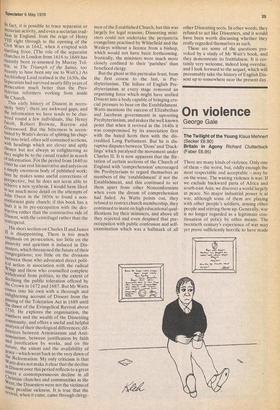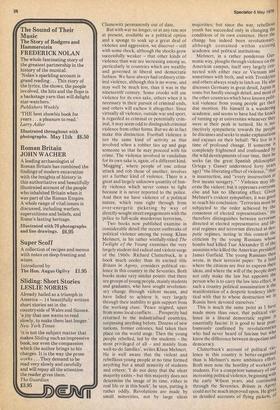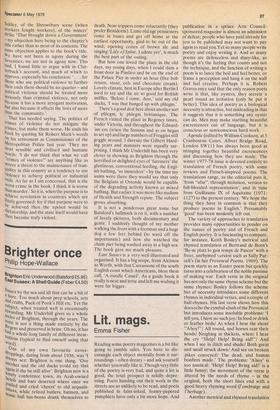On violence
George Gale
The Twilight of the Young Klaus Mehnert (Secker £6.90) Britain in Agony Richard Clutterbuck (Faber £6.95) There are many kinds of violence. Only one of them — the worst, but, oddly enough the most respectable and acceptable — may be on the wane. The waning violence is war. If we exclude backward parts of Africa and south-east Asia, we discover a world largely at peace. No major industrial power is at war, although some of them are playing with other people's soldiers, arming other people and stirring them up. Generally, war is no longer regarded as a legitimate continuation of policy by other means. The twentieth century's experience of war may yet prove sufficiently horrific to have made Clausewitz permanently out of date.
But with war no longer, or at any rate not at present, available as a political option and a sponge to soak up a great deal of violence and aggression, we discover – still with some shock, although the shocks grow successfully weaker – that other kinds of violence than war are increasing among us, particularly in countries which are wealthy and governed in liberal and democratic fashion. We have always had ordinary criminal violence, although this is no worse, and may well be much less, than it was in the nineteenth' century. Some crooks will use violence for its own sake, others when it is necessary in their pursuit of criminal ends, and others will eschew it altogether. Since virtually all violence, outside war and sport, is regarded as criminal or potentially criminal, it may seem odd to distinguish criminal violence from other forms. But we do in fact make this distinction. Football violence is not the same kind of activity as that involved when a robber ties up and gags someone so that he may proceed with his crime. The violence involved in vandalism for its own sake is, again, of a different kind. 'Mugging', where people of one colour attack and rob those of another, involves yet a further kind of violence. There is a great and largely unknown quantity of family violence which never comes to light because it is never reported to the police. And then we have violence of a political nature, which runs right through from over-energetic picketing by way of directly-sought street engagements with the police to full-scale murderous terrorism.
Two books now published examine in considerable detail the recent outbreaks of political violence among the young. Klaus Mehnert, in his rather wistfully-titled The Twilight of the Young examines the very largely student-led radical and violent surge of the 1960s. Richard Clutterbuck, in a book much cooler than its excited title Britain in Agony, considers political violence in this country in the Seventies. Both books make very similar points: that there are groups of young people, mainly students and graduates, who have sought revolutionary change through violent means, and have failed to achieve it, very largely through their inability to gain support from the working class: 'Peace reigned, apart from some local conflicts. . . Prosperity had returned to the industrialised countries, surpassing anything before. Dozens of new nations, former colonies, had taken their place on the world stage. Then the young people rebelled, led by the students – the most privileged of all – and mainly from well-to-do families', writes Klaus Mehnert. He is well aware that the violent and rebellious young people at no time formed anything but a small minority of students and others: 'I do not deny that the silent majority exists – but this majority does not determine the image of its time, either in real life or in this book', he says, putting it rather oddly. Revolutions are made by small minorities, not by large silent majorities; but since the war, rebellious youth has succeeded only in changing the conditions of its own existence. Here the change has indeed been revolutionary, although contained within existing academic and political institutions.
Mehnert, in a rather ponderous Germanic way, ploughs through violence on the American campus, itself very largely connected with either race or Vietnam and sometimes with both, and with Trotskyists and others always ready to latch on. He als° discusses Germany in great detail, Japan le some but hardly enough detail, and most of the other countries which have known por ical violence from young people get their due mention. He himself is a wandering academic, and seems to have had the knack of turning up at universities whenever they were at their peak in turmoil. He is ins" tinctively sympathetic towards the people he discusses and seeks to make explanations and excuses on their behalf: 'We live in ,e time of profound change. If someone Is completely frightened and confounded bY the wild developments of our time, then he seeks (as the great Spanish philosoPher Ortega y Gasset understood forty years ago) "the liberating effect of violence," that is insurrection, and "every insurrection.ar first means savagery."' Violence may 114' erate the violent: but it oppresses everyone else and has no liberating effect. Given Mehnert's evident sympathies, it was good to reach his conclusion: 'Terrorists must be, subjected to the order achieved by the consensus of elected representatives.' He therefore distinguishes between terrortstn directed at elected representative and lib' eral regimes and terrorism directed at despotic regimes, noting in this context the criticism by the young Russians whose bombs had killed Tsar Alexander II of the assassins who killed the American president James Garfield. The young Russians then wrote, in their terrorist paper: 'In a Ian' where the citizens are free to express their ideas, and where the will of the people doeS not only make the law but appoints the person who is to carry the law into effect, in such a country political assassination is the manifestation of a despotic tendency identical with that to whose destruction we In Russia have devoted ourselves.'
This is much the same point as I haye made more than once, that political vto
lence in a liberal democratic regime Is essentially fascist: It is good to hear po!t humously confirmed by revolutionaries who had never heard of fascism but wh° know the difference between despotism and democracy. Clutterbuck's account of political violence in this country is better-organised
than is Mehnert's more ambitious effort.
Both men note the hostility of workers to students. For a competencsummary of our
increasing political violence, beginning with the early Wilson years, and continua through the Seventies. Britain in AgollY could not be much improved upon. He gives, us detailed accounts of flying pickets, 0' Saltley, of the Shrewsbury scene (when Workers fought workers), of the miners' strike `That hi-ought down a Government' -.my objection here being to the chapter's title rather than to most of its contents. The same objection applies to the book's title. We have not been in agony during the Seventies; we are not in agony now. This said, I found little to argue with in Clutterbuck's account, and much of which to approve, especially his conclusion: . . . for those who use political violence to further their ends there should be no quarter and Political violence should be treated more seriously than criminal violence, not only because it has a more arrogant motivation, but also because it affects the lives of more than the community.'
That has needed saying. The politics of crimes of violence do not mitigate the crimes, but make them worse. He ends his book by quoting Sir Robert Mark's words un his retirement as Commissioner of the Metropolitan Police last year. They are illost sensible and civilised and humane Words: 'I do not think that what we call crimes of violence" are anything like as Severe a threat to the maintenance of tranquility in this country as a tendency to use violence to achieve political or industrial ends. As far as I am concerned, that is the worst crime in the book. I think it is worse than murder.' So it is, when the purpose is to achieve revolution in countries which are freely governed: for if that purpose were to ue achieved then the upshot would be dictatorship, and the state itself would have then become truly violent.








































 Previous page
Previous page